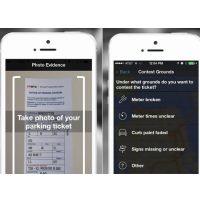Cities Battle Smartphone App that “Fixes” Tickets

Parking tickets have become an increasingly larger part of city budgets in recent years, so it’s not surprising to find that they would take a dim view of any technology that reduces that revenue stream.
At least three California cities—Los Angeles, San Francisco and Oakland—have allegedly blocked the smartphone app Fixed, which offers users a decent chance of beating a parking ticket. It launched in February 2014 and has reportedly gotten 10,000 tickets tossed.
Fixed co-founder David Hegarty told TechCrunch, “Over 50% of tickets have an issue or error that makes them invalid.”
Folks who run afoul of the parking authorities scan their tickets onto their phones and send them to Fixed. There, employees trained in the myriad ways tickets can be screwed up assess the situation, even use Google Streetview to check signage, and make direct, documented appeals to the city on behalf of the client. If necessary, Fixed will recommend an affordable lawyer to escalate the defense. All of this costs the client some money.
Cities have jousted with the company from the outset. In San Francisco, the home of Fixed, there were accusations that the San Francisco Municipal Transportation Agency (SFMTA) had turned off its fax machines to thwart the company. But the real killer was when Xerox Corporation, which operates the backend computer support for ticketing for SFMTA and other cities, made what it called a security change that effectively blocked Fixed.
Fixed complained that it had been targeted, but Xerox, in an email to Naked Security, said it was addressing a larger issue:
“Fixed has not been blocked from ticket websites in Oakland, San Francisco and Los Angeles. What has occurred is that Xerox implemented industry standard Payment Card Industry (PCI) best practices for all our public facing web sites to protect our system security. The sites no longer allow mass electronic automated system access.”
Xerox insisted it was not acting at the request of SFMTA and the change was “not directed at any one company.”
So far, no one is accusing Fixed of doing anything illegal, or improper, for that matter. Unlike sharing-economy apps like Uber and Airbnb that employ innovative business models to skirt all manner of law, Fixed works directly with the legal system to reduce law enforcement errors, streamline processes and deliver a just outcome in judicial proceedings.
Los Angeles parking ticket revenue rose from $110 million in 2003 to $161 million last year. Parking tickets are the sixth most significant source of money for the Long Beach general fund. Parking Panda, which has an app for finding parking, says Los Angeles was second only to New York City in raising money from parking tickets. San Diego was eighth and San Jose was tenth.
Should Fixed survive the municipal pushback, it could get broadsided by another emerging technology, self-driving cars. Unfortunately, cities, themselves, could be sitting in the passenger seat. A report (pdf) from The Brookings Institution says the game changes once the driverless cars get a government thumbs up:
“If vehicles are busy almost every hour of the day dropping off one traveler to pick up another based on highly predictive algorithms that harness user data to maximize efficient use of resources, then parking, towing, traffic violations and speeding tickets revenue will significantly decrease.”
–Ken Broder
To Learn More:
“Fixed” App That Fights Parking Tickets “Blocked” in 3 Cities (by Lisa Vaas, Naked Security)
More Cities Are Blocking the App That Helps You Fight Parking Tickets (by Adam Clark Estes, Gizmodo)
Cities Kick Out Smartphone App Threatening Parking Ticket Revenue (by Payton Alexander, Watchdog Arena)
Fixed Raises $1.2 Million for a Mobile App That Fights Your Parking Tickets for You (by Sarah Perez, TechCrunch)
- Top Stories
- Controversies
- Where is the Money Going?
- California and the Nation
- Appointments and Resignations
- Unusual News
- Latest News
- California Forbids U.S. Immigration Agents from Pretending to be Police
- California Lawmakers Urged to Strip “Self-Dealing” Tax Board of Its Duties
- Big Oil’s Grip on California
- Santa Cruz Police See Homeland Security Betrayal in Use of Gang Roundup as Cover for Immigration Raid
- Oil Companies Face Deadline to Stop Polluting California Groundwater





